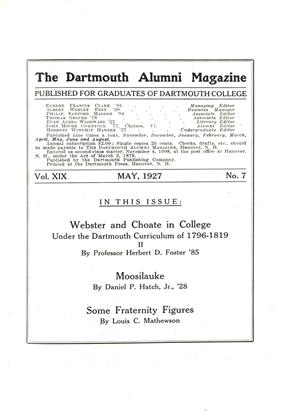The custom at Dartmouth, with possibly isolated exceptions in which individual classes may have special funds designed to assist those who might otherwise find returning to reunions difficult, is for every returning alumnus to care for his own expenses. As a result it is usual for attendance to vary with the different classes, or with the same class at different times. The expedient of the '94 cup, offered many years ago by the class of 1894 for the class securing the greatest percentage of attendance from its living graduates, has operated with varying success to inspire classes to attempt to win it, and in the case of the older and smaller classes often produces an attendance of from 70 to 80 per cent—but is naturally much less effectual in the case of classes containing several hundred men than in that of a class numbering under a hundred. Now comes a novel suggestion, tried out in past years at Yale and Princeton, but more recently and more elaborately at Cornell, in which classes of large size undertake to provide by budget and assessment a fund which will enable any alumnus, no matter where situated in the United States, to make the journey to Ithaca at a uniform expense. The Cornell theory is that "all places are equidistant from Ithaca" and the results are said to be very satisfactory.
Even so, the figures submitted may seem surprisingly small with all this assistance. Out of a possible 1300, at the reunion of the class in question ('16) 167 men returned. The budget was figured on a probable 10 per cent, or 130 men; and the actual number present doubtless much exceeded what it would have been otherwise. The budget adopted called for a total of $10,000 of which $4000 was for transportation expenses and the remainder for an elaborate program including costumes, meals, a dinner for the class, band music and the like, as well as various entertainments. The assessment was figured at $50 to be secured from 200 men.
Whether the size and composition of Dartmouth classes at present invites a similar experiment may be doubtful, but there is in it the germ of an idea which may bear fruit in making it easier for the remoter men to come back. The expense of a journey east from the Pacific slope is very great and doubtless deters many men who would come regularly to reunions if the trip cost no more than does the ride up from Boston. The Cornell idea seems to be to average up the distances, so that the average fare would be about $20 regardless of the actual mileage. That there is either the necessity or the chance for an exactly similar plan in the case of larger Dartmouth classes seems problematical; but if there can be developed a plan whereby those whom it costs less to return can even up the cost for those who would have to pay a great deal, something very practical may be done to insure more adequate figures in the case of large and widely scattered classes. The merit of it lies in part in the fact that there is no feeling of charity involved, such as might operate to deter sensitive men who were offered direct and individual assistance in meeting exceptional transportation charges.
 View Full Issue
View Full Issue
More From This Issue
-
 Article
ArticleWEBSTER AND CHOATE IN COLLEGE
May 1927 By Herbert Darling Foster '85 -
 Article
ArticleTHE UNDERGRADUATE CHAIR
May 1927 -
 Article
ArticleMOOSILAUKE
May 1927 By Daniel P. Hatch, Jr. '28 -
 Article
ArticleSOME FRATERNITY FIGURES
May 1927 By Louis C. Mathewson -
 Article
ArticleDARTMOUTH STUDENTS SAID TO BE IRRELIGIOUS
May 1927 -
 Class Notes
Class NotesClass of 1921
May 1927 By Herrick Brown
Article
-
 Article
ArticleAlumni Articles
May 1951 -
 Article
ArticleA Salute to Hovey
MAY 1964 -
 Article
ArticleGreen Jottings
January 1954 By CLIFF JORDAN '45 -
 Article
ArticleTHE UNDERGRADUATE CHAIR
December 1934 By Milburn McCarty IV '35 -
 Article
ArticleNorth of Boston
April 1950 By Parker Merrow '25 -
 Article
ArticleLOUIS HENRY DOW
April 1944 By PRESCOTT ORDE SKINNER


